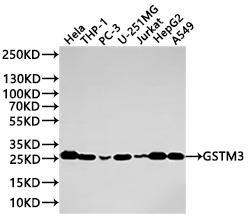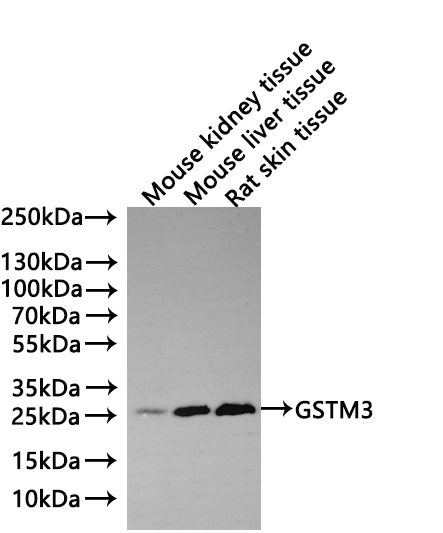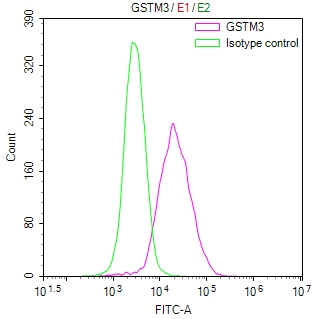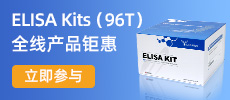GSTM3 Recombinant Monoclonal Antibody
-
中文名稱:GSTM3 Recombinant Monoclonal Antibody
-
貨號(hào):CSB-RA009982MA1HU
-
規(guī)格:¥1320
-
圖片:
-
Western Blot
Positive WB detected in: HeLa whole cell lysate(20μg), THP-1 whole cell lysate(20μg), PC-3 whole cell lysate(20μg), U-251MG whole cell lysate(20μg), Jurkat whole cell lysate(20μg), HepG2 whole cell lysate(20μg), A549 whole cell lysate(20μg)
All lanes: GSTM3 antibody at 1:1000
Secondary
Goat polyclonal to rabbit IgG at 1/40000 dilution
Predicted band size: 27 kDa
Observed band size: 27 kDa
Exposure time:2min -
Western Blot
Positive WB detected in: Mouse kidney tissue lysate(20μg), Mouse liver tissue lysate(20μg), Rat skin tissue lysate(20μg)
All lanes: GSTM3 antibody at 1:1000
Secondary
Goat polyclonal to human IgG at 1/40000 dilution
Predicted band size: 26.6 kDa
Observed band size: 27 kDa
Exposure time: 2min -
IHC image of CSB-RA009982MA1HU diluted at 1:100 and staining in paraffin-embedded human testis tissue performed on a Leica BondTM system. After dewaxing and hydration, antigen retrieval was mediated by high pressure in a citrate buffer (pH 6.0). Section was blocked with 10% normal goat serum 30min at RT. Then primary antibody (1% BSA) was incubated at 4°C overnight. The primary is detected by a Goat anti-human polymer IgG labeled by HRP and visualized using 0.05% DAB.
-
IHC image of CSB-RA009982MA1HU diluted at 1:100 and staining in paraffin-embedded human kidney tissue performed on a Leica BondTM system. After dewaxing and hydration, antigen retrieval was mediated by high pressure in a citrate buffer (pH 6.0). Section was blocked with 10% normal goat serum 30min at RT. Then primary antibody (1% BSA) was incubated at 4°C overnight. The primary is detected by a Goat anti-human polymer IgG labeled by HRP and visualized using 0.05% DAB.
-
Overlay Peak curve showing MCF-7 cells stained with CSB-RA009982MA1HU (red line) at 1:100. The cells were fixed in 4% formaldehyde and permeated by 0.2% TritonX-100 for?10min. Then 10% normal goat serum to block non-specific protein-protein interactions followed by the antibody (1ug/1*106cells) for 45min at 4℃. The secondary antibody used was Fluorescein (FITC) AffiniPure Goat Anti-Human IgG, Fcγ fragment specific at 1:200 dilution for 35min at 4℃.Control antibody (green line) was human IgG1 (1ug/1*106cells) used under the same conditions. Acquisition of >10,000 events was performed.
-
-
其他:
產(chǎn)品詳情
-
Uniprot No.:
-
基因名:GSTM3
-
別名:brain GST antibody; brain type mu glutathione S transferase antibody; glutathione S alkyltransferase M3 antibody; glutathione S aryltransferase M3 antibody; glutathione S transferase M3 (brain) antibody; glutathione S transferase M3 antibody; Glutathione S transferase Mu 3 antibody; glutathione S transferase, Mu 3 antibody; Glutathione S-transferase Mu 3 antibody; GST class mu 3 antibody; GST class-mu 3 antibody; GST5 antibody; GSTB antibody; Gstm3 antibody; GSTM3-3 antibody; GSTM3_HUMAN antibody; GTM3 antibody; hGSTM3-3 antibody; MGC3310 antibody; MGC3704 antibody; S (hydroxyalkyl)glutathione lyase M3 antibody
-
反應(yīng)種屬:Human, Mouse, Rat
-
免疫原:Recombinant Human GSTM3 protein
-
免疫原種屬:Homo sapiens (Human)
-
標(biāo)記方式:Non-conjugated
-
克隆類型:Monoclonal
-
抗體亞型:hIgG1
-
純化方式:Affinity-chromatography
-
克隆號(hào):2H9D7
-
濃度:It differs from different batches. Please contact us to confirm it.
-
保存緩沖液:Preservative: 0.03% Proclin 300
Constituents: 50% Glycerol, 0.01M PBS, PH 7.4 -
產(chǎn)品提供形式:Liquid
-
應(yīng)用范圍:ELISA, WB, IHC, FC
-
推薦稀釋比:
Application Recommended Dilution WB 1:500-1:2000 IHC 1:50-1:200 FC 1:50-1:200 -
Protocols:
-
儲(chǔ)存條件:Upon receipt, store at -20°C or -80°C. Avoid repeated freeze.
-
貨期:Basically, we can dispatch the products out in 1-3 working days after receiving your orders. Delivery time maybe differs from different purchasing way or location, please kindly consult your local distributors for specific delivery time.
-
用途:For Research Use Only. Not for use in diagnostic or therapeutic procedures.
相關(guān)產(chǎn)品
靶點(diǎn)詳情
-
功能:Conjugation of reduced glutathione to a wide number of exogenous and endogenous hydrophobic electrophiles. May govern uptake and detoxification of both endogenous compounds and xenobiotics at the testis and brain blood barriers.
-
基因功能參考文獻(xiàn):
- Differential activity of antioxidant enzymes caused by the polymorphism in GSTM3 may contribute to resistance to hormonal therapy through oxidative stress. The GSTM3 rs7483 polymorphism may be a promising biomarker for prostate cancer patients treated with androgen-deprivation therapy (ADT) PMID: 27993795
- Expression of GSTM3 might be regulated by epigenetic changes in lens tissue. Hypermethylation in GSTM3 promoter and altered histone modification might have a role in the ARC formation. PMID: 27607418
- No associations between the GSTT1, GSTP1, and GSTM3 genotypes and neoplasia risk were observed. In conclusion, we determined the genotype distribution of GST polymorphisms in control subjects and breast cancer patients from northeastern Mexico. PMID: 26125851
- NSD1 interacted with RNAPII and bound to GSTM3 -63A/C TATA box. PMID: 25193115
- All three markers correlated significantly with regional lymph node metastasis: FXYD3 (p = 0.0110), S100A11 (p = 0.0071), and GSTM3 (p = 0.0173) in colon cancer lymphatic metastasis. PMID: 22430872
- This meta-analysis suggests that the GSTM3 A/B polymorphism may be an important protective factor for head and neck cancer, especially of laryngeal cancer and Caucasian populations. PMID: 24416175
- rs1332018 genetic variants in the GSTM3 promoter predispose the host to downregulating GSTM3 expression in kidney, facilitate carcinogenesis, and predict an unfavourable postoperative prognosis of renal cell carcinoma. PMID: 24157827
- In conclusion, this epistatic interaction showed a high degree of consistency when stratifying by sex, the epsilon4 allele of apolipoprotein E genotype, and geographic region. PMID: 23036584
- The GSTM3 A/B gene polymorphism is not associated with lung cancer susceptibility. PMID: 23167362
- Methylation of GSTM3 promoter may contribute to oxidative stress-associated liver damage and correlate with the disease severity in Acute-on-chronic hepatitis B liver failure. PMID: 22976281
- There were no significant differences in distribution of 3-bp deletion polymorphism in intron 6 variant allele in Glutathione-S-transferase M3 between chronic obstructive pulmonary disease patients and controls in a north Indian population. PMID: 21513434
- In individuals from Angola, Mozambique and the Sao Tome e Principe islands, the GSTM3*B allele was three times more frequent (0.74-0.78) than the GSTM3*A allele (0.22-0.26), with no significant differences in allele frequency across the three groups. PMID: 20549140
- Diminished GSTM3 mRNA levels correlated with decreased minichromosome maintenance deficient 3 (MCM3) mRNA levels in a diagnostic and SNP-dependent fashion in Alzheimer disease. PMID: 18423940
- The presence of the GSTM3*B allele appears to associated with a reduced risk of laryngeal squamous cell carcinoma. PMID: 19922706
- No increased prostate scancer risk for men carrying any of the GSTM1 or GSTT1 genotypes. PMID: 14968442
- Glutathione S-transferase hGSTM3 has a role in ageing-associated neurodegeneration PMID: 15621212
- GSTM3 -63C allele strongly affects gene expression and suggests that individuals who carry the low expression allele may be deficient in glutathione transferase catalyzed biological functions. PMID: 15665284
- Single marker association analyses revealed that the AGG/AGG genotype of the GSTM3 rs1799735 (del/AGG) polymorphism was associated with an increased risk of AD (p=0.05), especially in the group of APOE4-allele non-carriers (p=0.004; OR=2.07). PMID: 17904251
- distribution of -63A/C polymorphism of human glutathione S-transferase M3(GSTM3) gene in Chinese Han population and the association of -63A/C polymorphism with essential hypertension PMID: 17922434
- The GSTM3*A/*A genotype was 76% in cancer cases versus 74% in controls; a significant association between smoking status and GSTM3 genotype was not detected. PMID: 18569590
- Our results suggested GSTM3 (AB + BB) genotype to be significantly associated with prostate cancer risk. PMID: 18668224
- GST-M3 activity is possibly involved in protection against mucosal atrophy caused by H. pylori as the levels of IgG titer and pepsinogen I are linked to mucosal status. PMID: 19696791
- The researchers found evidence of an increased risk for non-Hodgkin's lymphoma in women who used hair dye before 1980 and who were carriers of the GSTM3 intron 6 deletion. PMID: 19822571
顯示更多
收起更多
-
亞細(xì)胞定位:Cytoplasm.
-
蛋白家族:GST superfamily, Mu family
-
組織特異性:Testis and brain.
-
數(shù)據(jù)庫鏈接:
Most popular with customers
-
-
Phospho-YAP1 (S127) Recombinant Monoclonal Antibody
Applications: ELISA, WB, IHC
Species Reactivity: Human
-
-
-
-
-
-
























